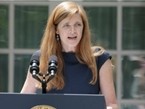
Outrage is growing at U.N. Ambassador Samantha Power’s Sunday night tweet which seemed to suggest that terror victim Daniel Pearl shared some of the responsibility for his own murder at the hands of al-Qaeda terrorist Khaled Sheik Muhammed, who kidnapped, tortured, and videotaped Pearl’s decapitation in Pakistan in February 2001.
Power’s original tweet, posted late Sunday EST following the annual Daniel Pearl Foundation Dinner in Los Angeles, read:
Reaction was so forceful and swift that Power was forced to attempt a walk back by issuing follow up tweets that tried to squelch the criticism. One read:
Controversy is nothing new to the outspoken Power, who built a successful career as a far-left academic advocating provocative positions that included opposition to the use of U.S. military forces in overseas action that could benefit U.S. national security. The primary function of the U.S. military, Power suggested, should be to act not to advance or protect U.S. national security interests, but to protect human rights.
In 2001 she wrote an essay for The Atlantic magazine that accused the United States of genocide for its failure to insert U.S. military forces in the Rwandan civil war. The next year she went even further in actually suggesting that the U.S. spend billions of dollars to deploy the U.S. military as an invasion and occupation force against Israel to impose an Israeli-Palestinian peace.
Her proposal was thought even more repellent in that it was made at the height of a murderous terror war then being waged against Israeli civilians by Islamic Palestinian terrorists. Against this backdrop she suggested that the United States deploy its armed forces not to defend Israel, but rather to defend the terrorists attacking Israel.
It was Samantha Power who first proposed President Obama’s notorious 2009 “Apology Tour” as a way to “build credibility” with the international community by “making amends for past U.S. ‘sins.’” She wrote that “much anti-Americanism derives from the role U.S. political, economic, and military power has played in denying such freedoms to others.”
She also supported then-candidate Obama’s promise to “negotiate” with rogue regimes or dictators without preconditions if elected president.
As offensive as her anti-Israel comments might have appeared to American Jews and other supporters of Israel, they were apparently not offensive or objectionable enough for a single major American Jewish organization to publicly oppose her nomination to become U.S. ambassador to the United Nations. AIPAC, the American Israel Public Affairs Committee, did not take a position on the Power nomination.
Power was confirmed last summer as U.N. Ambassador by a strong Senate majority that included every single Democrat and a number of Republicans, all of whom had full access to volumes of Power’s past work.

COMMENTS
Please let us know if you're having issues with commenting.